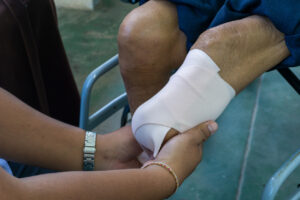
One of the most serious wounds you can sustain in an accident is an amputation injury. This refers to the loss of a body part through either a traumatic accident or a surgical procedure. An amputation can impact how you live and perform daily tasks, and it can prevent you from earning a living.
If this type of catastrophic injury occurred because of another party’s misconduct, you may be entitled to begin a personal injury claim. Learn more about the most common causes of amputation injuries and what your legal options may be.
Understanding Amputation Injuries

An amputation injury involves the loss of a limb or extremity, such as an arm, leg, hand, or foot. These injuries can be traumatic (caused by accidents) or surgical (performed to prevent further medical complications like infection or tissue death).
Recovery after an amputation often involves:
- Extensive hospitalization and rehabilitation
- Physical therapy and prosthetic fitting
- Psychological and emotional adjustment
- Long-term changes to mobility and independence
Even with proper treatment, amputations can cause chronic pain, phantom limb sensations, and significant emotional distress. Understanding the severity of these injuries helps highlight why victims deserve compensation when another party’s negligence is to blame.
Common Causes of Amputation Injuries
An amputation injury can occur as a result of a traumatic accident or even because of medical malpractice.
Vehicular Accidents
Car, motorcycle, and truck accidents are often the cause of amputations. The direct impact of the crash causes immense pressure on limbs, resulting in damage that is impossible to repair. To avoid complications, like the development of septicemia, your doctor will recommend amputation.
It’s also possible for collisions to result in compartment syndrome. This condition causes such immense pressure in muscle groups that circulation is cut off, resulting in tissue death. An amputation could be the only way of addressing the problem.
The immediate force of the impact could directly cause the amputation. This puts you at risk of fatal blood loss.
Medical Malpractice
Medical malpractice occurs when a medical professional does not offer the expected and accepted standard of care. If another professional would not have made the same error, it is considered malpractice.
Some of the most common mistakes involve surgeons performing operations on the wrong patient or body part. This can lead to people losing body parts by mistake.
Workplace Accidents
Amputations can also occur in your workplace. If you deal with heavy machinery, you could get parts of your body crushed or torn off. Workplace accidents are most common in industrial settings and construction sites, but they can occur at any location with heavy machinery.
Filing a Personal Injury Claim After an Amputation Injury
If you have suffered an amputation injury, filing a personal injury claim can be an option if you can demonstrate that the other party was negligent or wrongful in their conduct. In most cases, you will have to show that they owed you a responsibility they failed to uphold, resulting in losses for which you can be compensated.
These claims will involve negotiating with insurance companies for a settlement. That’s not a simple process to undertake. Insurers will do everything they can to minimize your claim. This is one of the main reasons why you need an attorney to assist you.
Damages Available in an Amputation Injury Case
A personal injury claim allows you to recover the losses you sustained as a result of the injury. You can obtain economic and non-economic damages.
Economic Damages
Economic damages compensate for the measurable financial losses caused by an amputation injury.
These damages can include:
- Medical expenses, such as hospital stays, surgeries, therapy, prosthetics, and assistive devices
- Future medical costs for ongoing treatment and rehabilitation
- Lost wages for time missed from work during recovery
- Loss of earning capacity if you can no longer work or must take a lower-paying job
- Funeral expenses and the loss of household services if a loved one died from the injury
These damages aim to restore your financial stability after a life-altering injury.
Non-Economic Damages
Non-economic damages address the personal and emotional effects of an amputation that don’t have a set dollar value, such as:
- Physical pain and suffering
- Emotional distress, including anxiety and depression
- Loss of enjoyment of life due to permanent disability or lifestyle changes
- Loss of companionship or consortium if a loved one passed away
These damages recognize the human cost of an amputation injury and the profound ways it can affect your life and relationships.
Contact the St. Louis Personal Injury Attorneys at Eason Car Accident and Personal Injury Lawyers for Help Today
After suffering an amputation injury because of another party’s negligence, you may be entitled to compensation. At Eason Car Accident and Personal Injury Lawyers, our team of St. Louis personal injury lawyers can assist you through this difficult moment in your life. Contact us at (314) 932-1066 to schedule a free consultation.
